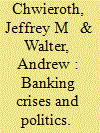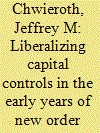|
|
|
Sort Order |
|
|
|
Items / Page
|
|
|
|
|
|
|
| Srl | Item |
| 1 |
ID:
155478


|
|
|
|
|
| Summary/Abstract |
Were the extensive policy responses of many governments to the financial crises of 2007–9 and the political events that have followed them exceptional? We show that over the course of nearly 150 years, severe banking crises have become more consequential for policy and politics in democracies than ever before. First, governments have become much more likely over time to opt for extensive bailouts and other policies aimed at wealth protection during crises. Second, the inclination of voters to punish governments that are in office when crises occur has also increased sharply over time. We argue that the main cause of both developments is the rise of ‘great expectations’ among large segments of society in modern democracies regarding public responsibility for the protection of wealth in the post-1945 era. Especially since the 1970s, severe banking crises returned and have posed a growing threat to this wealth and thus to the prospects of many households, including large segments of the ‘middle class’. This rising ‘mass pressure from below’ on governments to secure household wealth has provided an important source of pressure on policymakers to respond with increasingly costly bailouts, with powerful and ongoing political consequences.
|
|
|
|
|
|
|
|
|
|
|
|
|
|
|
|
| 2 |
ID:
136610


|
|
|
|
|
| Summary/Abstract |
What accounts for the spread of Sovereign Wealth Funds (SWFs)? Despite the increasing importance of SWFs in the global economy, we lack persuasive systematic answers to that question. Most analysts take for granted that economic imperatives drive the creation of SWFs; governments create them as effective solutions to the challenges generated by reserve accumulation and commodity-export specialization. In this article, I argue that the evidence fails to support this theory. Instead, the spread of SWFs best resembles the diffusion of a fashion or fad. SWFs became fashionable as an appropriate approach for reserve- and resource-rich countries seeking to manage policy uncertainty related to these economic characteristics. As other countries developed the same characteristics, they followed the lead of their peers and also created SWFs. I provide, with the use of a new data set, the first cross-national political-economy statistical analysis of SWF creation. The results suggest peer group emulation has, indeed, been crucial in shaping the decision of many countries to create SWFs—especially in fuel-exporting countries.
|
|
|
|
|
|
|
|
|
|
|
|
|
|
|
|
| 3 |
ID:
097909


|
|
|
|
|
| Publication |
2010.
|
| Summary/Abstract |
How do crises lead to change? Rationalist approaches to the question that emphasize inexorable structural responses and the pursuit of distributive preferences by newly dominant coalitions, are inadequate because they obscure the social mediation of material events and the pervasive uncertainty that follows destabilization of the precrisis status quo, which constrains actors from fully grasping their distributive preferences. Until uncertainty is reduced, persuasion emerges as a key mechanism of change. Although constructivist approaches emphasize persuasive practices, they have yet to adequately specify the scope conditions underpinning the selection of new ideas. This article goes beyond much of the constructivist focus on domestic legitimacy and static notions of resonance by emphasizing external credibility and dynamic processes of resonance-building by norm entrepreneurs. The author specifies four features-what he calls the four Cs of crisis resolution-that shape the process of idea selection: carriers, composition, crossover appeal, and credibility. Developing these arguments in the case of the early years of New Order Indonesia, the article suggests that whenever a prominent and cohesive group of advocates promotes an idea that has sufficient ideational and distributive appeal and the endorsement of external actors whose seal of approval is perceived as important, intersubjective belief change, and thus institutional and policy change, is more likely.
|
|
|
|
|
|
|
|
|
|
|
|
|
|
|
|
| 4 |
ID:
082060


|
|
|
|
|
| Publication |
2008.
|
| Summary/Abstract |
Beginning in the mid-1980s, in the absence of active encouragement from the IMF's management or member states, the staff began to encourage the liberalization of capital controls as a norm. This behavior constitutes a puzzle for the conventional wisdom, which sees the "Wall Street-Treasury Complex" as responsible for the IMF's approach, as well as a blind spot for rationalist approaches, which offer little insight into processes that shape preference formation "from within" international organizations (IOs). In a context where the Fund's member states permitted the staff considerable discretion and autonomy, I argue the staff's initial adoption of the norm of capital freedom was largely shaped by three internal processes: administrative recruitment, adaptation, and learning. But norm adoption did not mean the end of internal discussion, and a vigorous debate emerged between "gradualists" and supporters of the "big bang" over how the norm should be interpreted and applied. In this "battle of ideas," I emphasize the critical role of internal entrepreneurship
|
|
|
|
|
|
|
|
|
|
|
|
|
|
|
|
| 5 |
ID:
076504


|
|
|
|
|
|
|
|